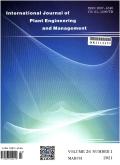Pump Bearing Fault Detection Based on EMD and SVM
International Journal of Plant Engineering and Management
Pub Date : 2018-07-22
DOI:10.1115/ICONE26-81584
引用次数: 2
Abstract
In nuclear power plant system, pump is the key equipment to maintain the flow of the primary loop coolant and the secondary loop heat transfer fluid. The main coolant pump and the feed water pump are in long-term operation status. Bearings are the key components to ensure stable operation of the pump, and which could be damaged in abnormal conditions. Once the failure occurred in the bearings, pumps would exhibit periodic vibration, which might cause the flow pulsations of coolant and heat transfer fluid; gradually, these situations could reduce the control accuracy and the stability of pump. Therefore, the detection and diagnosis of pump bearings are significant to improve the safety and stability of reactor system. We proposed an approach combined with signal processing and machine learning to extract the signal features and recognize the signal samples automatically. The proposed approach consists of three main steps: firstly, empirical mode decomposition (EMD) is applied to decompose the signals into several intrinsic mode functions (IMFs) which are corresponding to the different components of the original signals; secondly, calculating the correlation coefficient between each IMF and the original signal, the correlation coefficient sequence imply the components distribution of the signal which can be applied to recognize the signal samples; finally, extracting a part of correlation coefficient sequences to train the support vector machine (SVM), and then an classifier can be obtained and use to recognize the other signal samples automatically. Experimental results show that this method can effectively detect the pump bearing operating conditions and failures, and can provide a reference for the safe and stable operation of reactor pumps.基于EMD和SVM的泵轴承故障检测
在核电站系统中,泵是维持一次回路冷却剂和二次回路传热流体流动的关键设备。主冷却液泵和给水泵处于长期运行状态。轴承是保证泵稳定运行的关键部件,在异常工况下容易损坏。一旦轴承发生故障,泵将出现周期性振动,这可能导致冷却液和传热流体的流动脉动;这些情况逐渐降低了泵的控制精度和稳定性。因此,泵轴承的检测和诊断对提高反应堆系统的安全性和稳定性具有重要意义。我们提出了一种信号处理和机器学习相结合的方法来自动提取信号特征和识别信号样本。该方法包括三个主要步骤:首先,利用经验模态分解(EMD)将信号分解为几个固有模态函数(IMFs),这些函数对应于原始信号的不同分量;其次,计算各IMF与原始信号的相关系数,相关系数序列暗示信号的成分分布,可用于识别信号样本;最后提取一部分相关系数序列训练支持向量机(SVM),得到一个分类器,用于自动识别其他信号样本。实验结果表明,该方法能有效地检测到泵轴承的运行状态和故障,可为反应堆泵的安全稳定运行提供参考。
本文章由计算机程序翻译,如有差异,请以英文原文为准。
求助全文
约1分钟内获得全文
求助全文

 求助内容:
求助内容: 应助结果提醒方式:
应助结果提醒方式:


